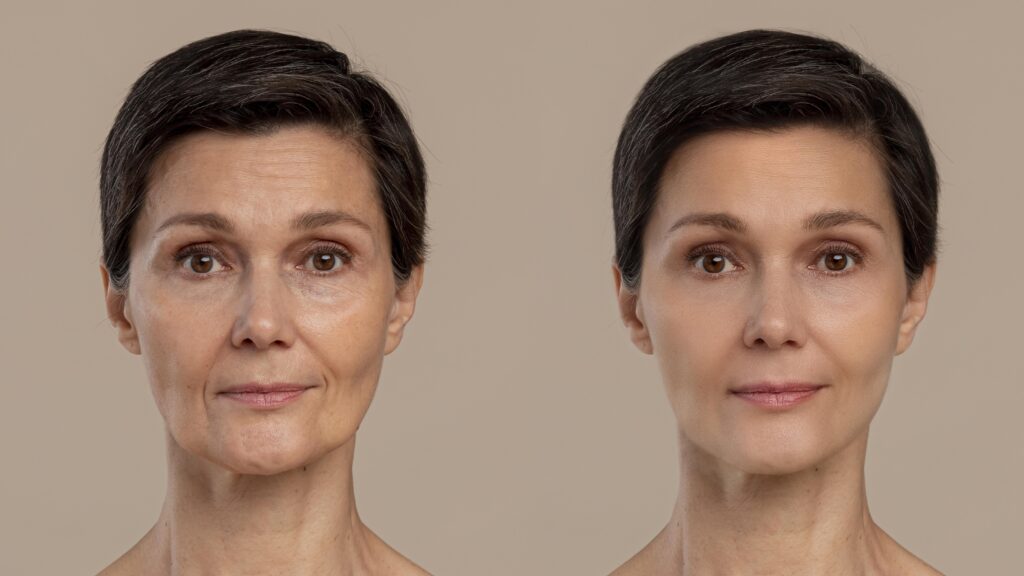
Dry skin and wrinkles are two common signs of aging; people always seem conscious about them. The connection between these two skin conditions seems logical. It is essential to understand the complex interplay between skin dryness and the development of wrinkles. There is a general beauty myth that dry skin causes wrinkles. In this blog, we will explore the myth; does dry skin cause wrinkles, and the relationship between dry skin and wrinkles. We will also shed light on the factors responsible for wrinkles. But before going into this, let us discuss some key points about dry skin and wrinkles.
What is Dry Skin?
A skin that doesn’t produce sebum or oil is considered dry skin. Our skin relies on oil to hold moisture in it. A dry skin that won’t hold moisture generally appears rough and flaky. It can cause several issues that may include:
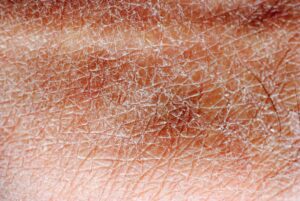
- Leading to a damaged barrier function
- Increasing sensitivity and inflammation
- Causing the breakdown of collagen
What are Wrinkles?
Wrinkles are the lines, folds, or ridges in the skin that commonly develop as a natural part of aging. Some wrinkles can become deep crevices or furrows as well. These are most often associated with the thinning of the skin, a decrease in the production of collagen and elastin, and a reduction in the skin’s ability to retain moisture. Wrinkles are more noticeable around your eyes, mouth, and neck.
Does Dry Skin Cause Wrinkles?
When the question arises, does dry skin cause wrinkles? The answer is that dry skin does not cause wrinkles- but can make them more noticeable. In reality, the actual cause of wrinkles is aging. So, all the factors that are significant in aging may cause wrinkles. Dry skin magnifies the signs of aging and makes the wrinkles more visible. However, dry skin is not the only factor that plays a role in making wrinkles more prominent.
Understanding the Skin Structure:
Understanding skin structure is crucial as it helps to comprehend the relationship between dry skin and wrinkles. Our skin consists of three primary layers known as:
- Epidermis
- Dermis
- Hypodermis
The epidermis is the outermost layer. It acts as a protective layer against the external factors. The second one, the dermis, lies beneath the epidermis. It contains blood vessels, collagen, elastin fiber, and glands responsible for moisturizing the skin. The hypodermis is the innermost layer just beneath the dermis. This layer consists of fat cells that provide insulation and cushioning.
What is the Actual Cause of Wrinkles?
All those factors involved in aging are the actual cause of wrinkles. These can be divided into two categories:
Intrinsic Factors in Wrinkle Formation:
Intrinsic factors are the inherent part of the aging process or the factors that are influenced by your genetics. The intrinsic factors that play a role in wrinkle formation include:
- Decreased hormone levels
- Decreased collagen production
- Reduced elastin production
- Reduced cell turnover
Your skin naturally becomes thinner, drier, and less elastic with age. All these symptoms contribute to the formation of wrinkles. It can be prominent when intrinsic factors play a dominant role.
Extrinsic Factors in Wrinkle Formation:
These are the external factors present in the environment. Extrinsic factors are usually more significant in wrinkle formation than intrinsic factors. These include:
- Excessive sun exposure
- Smoking
- Poor nutrition
- Repeated facial expression
Sun exposure is considered the most significant in developing wrinkles among all these extrinsic factors. Sun exposure damages collagen fibers and accelerates the aging process.
The Role of Moisture in Skin Health:
Moisture plays an essential role in maintaining adequate hydration for healthy skin. A lack of moisture in the skin can lead to:
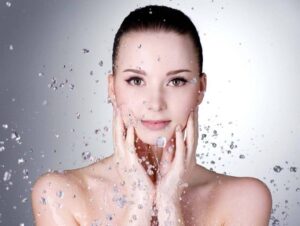
- Dryness
- Flakiness
- Itching
Keeping the skin moist will help prevent wrinkles and slow aging. For this, you must follow a skincare routine and all the effective moisturizing strategies.
How to Moisturize Skin to Reduce Fine Lines and Wrinkles?
There are three different components play a significant role in moisturizing your skin and help in reducing fine lines and wrinkles:
Humectants are the ingredients that attract moisture to the skin, such as glycerin or hyaluronic acid. Emollients are the ingredients that boost moisture to the skin’s surface. Occlusive lock in all the above to reduce trans-epidermal water loss (TEWL). These ingredients help the skin to plump, bouncy, and elegant. You need to apply all three components to reduce the appearance of fine lines and wrinkles. First, apply a hyaluronic acid serum to dampen the skin, use a non-active moisturizer, and apply a thin layer of petroleum jelly on top.
Effective Moisturizing Strategies:
To slow down the most significant signs of aging, i.e., wrinkles, you must opt for effective moisturizing strategies. These strategies help to keep your skin hydrated and play an important role in skincare. Some of the best effective moisturizing strategies are:
Use the Right Skincare Products:
Selection of the right skincare products must be essential to your daily life. Pay attention to the skin type you have. Is it oily or dry? Or is it acne-prone? You must use skincare products that are right for the skin type and your skin’s issues. Choose products with hyaluronic acid, a powerful hydrating ingredient in skin care. It can hold up to 1000 times its weight in water.
Always Wash Your Face Before Bed:
It is essential to wash off the day’s makeup, oil, and bacteria from your skin. For this, you must wash your face before bed daily. You must cleanse, exfoliate, tone, and apply a serum with anti-aging properties under your moisturizer. These are the important steps in the natural skincare routine.
Get Regular Facials:
A monthly deep pore cleansing in the form of a facial can be an excellent investment for your skin. Facials prevent aging and wrinkle formation and destroy bacteria to prevent breakouts.
Eat Foods Right for Your Skin:
For healthy skin, eat foods high in antioxidants like leafy green veggies, fruits, avocados, salmon, and nuts. They fight aging from the inside and are high in fiber, low in saturated fats, and a good source of vitamins. Also, using foods rich in omega-3 fatty acids helps maintain skin hydration from the inside out.
Drink Lots of Water:
For wrinkle-less skin, you need to hydrate from within. Water is the most important requirement for keeping your skin moist. Water needs may vary from person to person. It usually depends on body weight, activity level, health status, and external temperature. However, the general approach is to follow 13 glasses a day for men and 9 glasses a day for women.
Get Enough Sleep:
To get healthy and moisturized skin, you need to get proper sleep for the day. Sleep is the time when your body repairs the damage from the day. Interrupting this repair can slow down cell turnover and interfere with proper blood flow to the skin. Lack of sleep can also cause other skin conditions like acne, eczema, psoriasis, etc.
Always Wear Sunscreen:
Sunscreen protects your skin from harmful UV rays, helps to retain moisture, and prevents aging. Always wear a broad-spectrum sunscreen with an SPF of at least 30 daily.
Avoid Hot Water:
Hot water can deprive your skin of natural oils, leading to skin dryness. Always use lukewarm water for showers and baths. Also, try to limit your time in hot water.
Exfoliate Regularly:
It is the removal or shedding of dead skin cells. Exfoliate allows the moisturizers to penetrate better. However, do not overdo it, as excessive exfoliation can strip the skin of natural oils.
The Importance of Skincare Routine:
Maintaining a proper skincare routine is vital for you. It helps in protecting the skin and minimizing the appearance of wrinkles. The skincare routine involves all those strategies combating dry skin and preventing wrinkles. These strategies include:
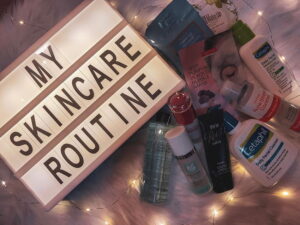
- Maintaining good hydration
- Protecting the skin from the sun
- Incorporating a nutrient-rich diet
- Avoiding harmful substances such as smoking and alcohol
A good skincare routine helps the skin in its natural ability to repair and protect itself. A skincare routine can help you address multiple aspects of skincare, leading to healthier and more youthful-looking skin.
Final Thoughts:
No strong evidence supports the myth that dryness directly causes wrinkles. Anyhow, dry skin contributes to discomfort and affects the skin’s appearance by contributing to the process of aging. Understanding the intrinsic and extrinsic factors in wrinkle formation is essential for skincare. You need to maintain good skin health through effective moisturizing , sun protection, and a healthy lifestyle to minimize the impact of wrinkles and other signs of aging. By dispelling the myth that dry skin causes wrinkles and knowing the reality, individuals can focus on skincare routines.
FAQs: Does Dry Skin Cause Wrinkles? Revealing The Truth!
Dry skin and wrinkles often appear together, leading many to believe one causes the other. But is there any truth to this assumption? Let’s delve deeper and answer some frequently asked questions about dry skin and wrinkles:
- Does Dry Skin Actually Cause Wrinkles?
No, dry skin itself doesn’t directly cause wrinkles. However, it can make them appear more prominent. Here’s why:
- Dehydration: Dry skin lacks moisture, causing the outer layer to become thinner and less plump. This makes existing wrinkles and fine lines more noticeable.
- Loss of Elasticity: Dry skin also loses some of its elasticity, the ability to bounce back. This can contribute to sagging and the appearance of wrinkles.
- So, Dry Skin Doesn’t Make Wrinkles Worse?
While not the direct cause, dry skin does make wrinkles more visible. Imagine a deflated balloon; the wrinkles are more noticeable on the less inflated surface. Similarly, dry skin lacks the plumpness that helps smooth out wrinkles.
- Can Moisturizing Prevent Wrinkles?
Moisturizing won’t erase wrinkles, but it can significantly improve their appearance. Here’s how:
- Hydration Boost: By locking in moisture, moisturizers plump up the skin, making wrinkles less noticeable.
- Improved Elasticity: Some moisturizers contain ingredients like ceramides that can help strengthen the skin’s barrier and improve elasticity, leading to a smoother appearance.
- What Moisturizer Ingredients Are Best for Dry Skin and Wrinkles?
Look for moisturizers containing ingredients like:
- Hyaluronic Acid: A humectant that attracts and holds moisture, plumping the skin.
- Ceramides: These lipids help strengthen the skin’s barrier and prevent moisture loss.
- Retinol: A powerful ingredient that stimulates collagen production, which improves skin firmness and reduces wrinkles (be sure to start slow and use at night).
- Should I Use a Different Moisturizer for Day and Night?
Night creams tend to be thicker and richer than day creams. They often contain ingredients like retinol, which can be too sensitive for daytime use. Day creams can be lighter and contain SPF for added sun protection.
- I Have Dry Skin, But My Skin Feels Greasy After Moisturizing. What’s Wrong?
This could be a sign that you’re using a moisturizer that’s too heavy for your skin type. Opt for a lightweight, oil-free lotion or gel if you have oily or combination skin.
- Can Dry Skin Cause Itching that Leads to Wrinkles?
Constant scratching due to dry, itchy skin can irritate the skin and potentially worsen wrinkles. Moisturizing regularly helps prevent this.
- Is There Anything Else I Can Do Besides Moisturizing to Combat Dry Skin and Wrinkles?
Absolutely! Here are some additional tips:
- Stay Hydrated: Drinking plenty of water keeps your skin hydrated from the inside out.
- Healthy Diet: Eat a diet rich in fruits, vegetables, and whole grains for essential nutrients that promote healthy skin.
- Sun Protection: Sun damage is a major contributor to wrinkles. Wear sunscreen with SPF 30 or higher every day.
- Manage Stress: Stress can exacerbate skin problems. Practice relaxation techniques like yoga or meditation.
- When Should I See a Dermatologist for Wrinkles?
If you’re concerned about wrinkles and want to discuss professional treatments like Botox or fillers, consult a dermatologist. They can recommend the best course of action for your specific needs.
- Can I Embrace My Natural Beauty and Not Worry About Wrinkles?
Absolutely! Wrinkles are a natural part of aging. Taking care of your skin and making healthy lifestyle choices can promote healthy aging and a radiant complexion. Embrace your natural beauty and focus on overall well-being at any age.
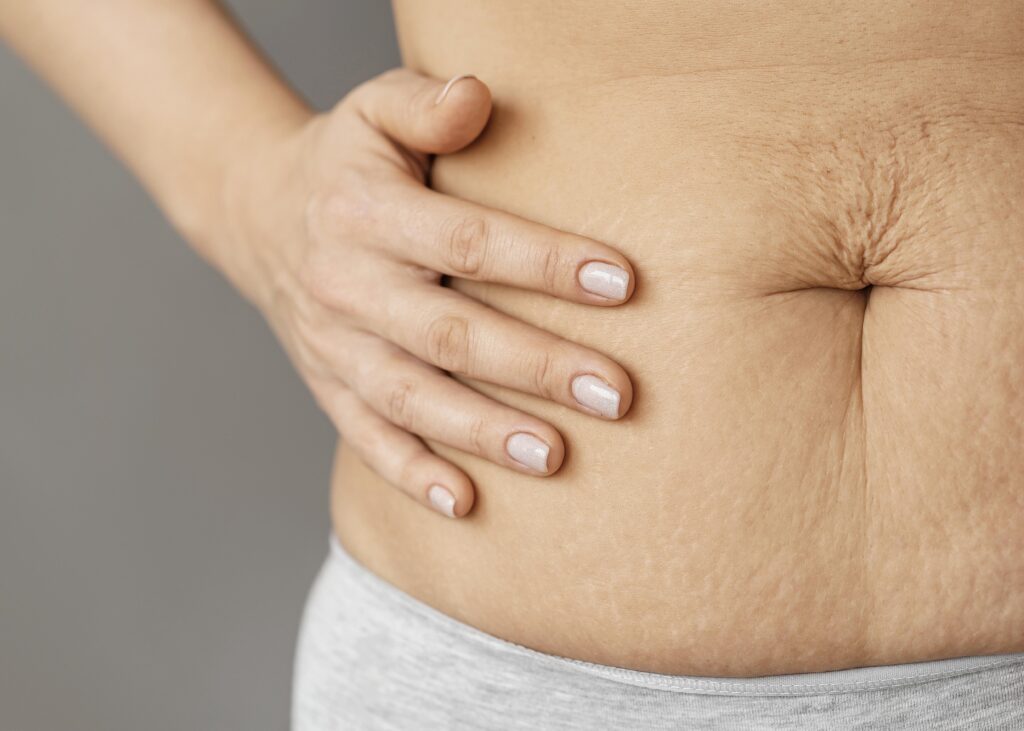
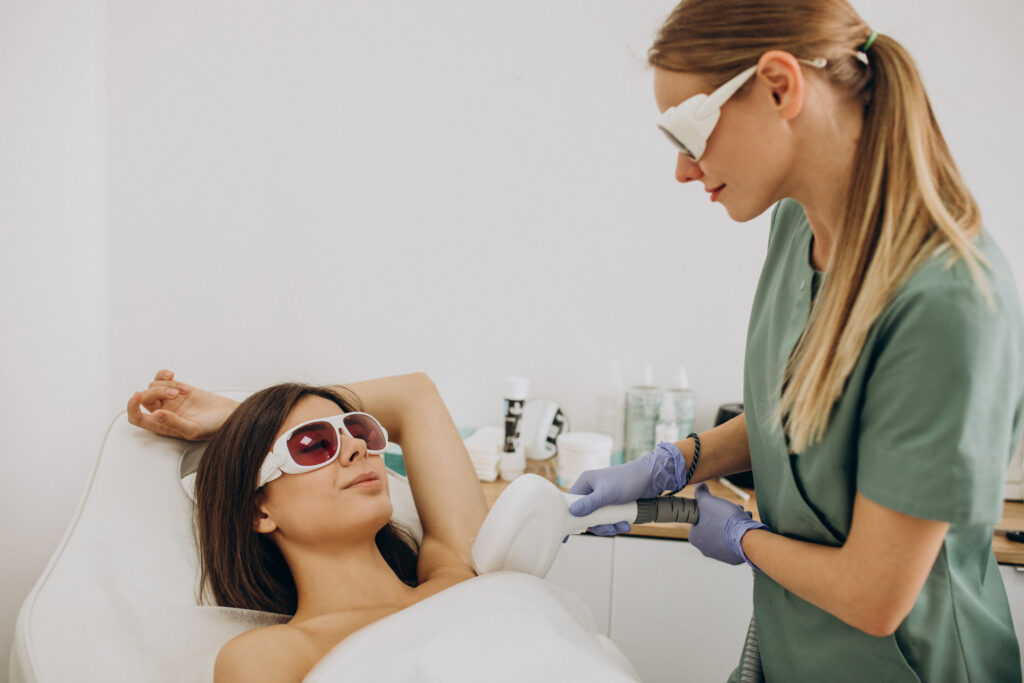
Good
Pingback: Uncover The 12 Best Facial Exercises To Reduce Wrinkles And Achieve Radiant Skin - ForbesPoint
Pingback: The Ultimate Guide To The Best Skincare Routine For Dry Skin With Hyperpigmentation - ForbesPoint